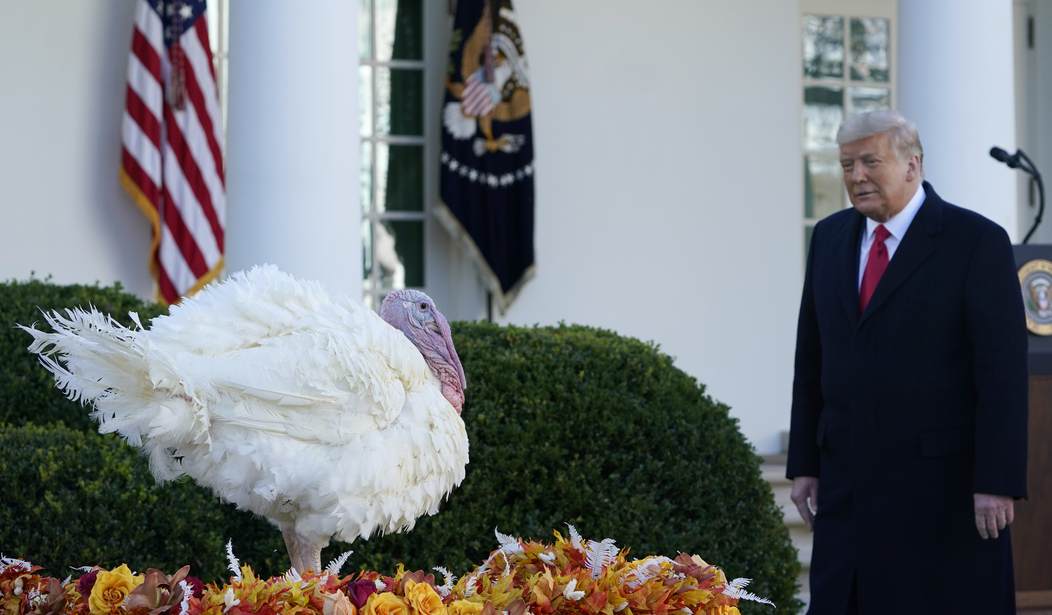Growing up, Thanksgiving was always -- by far -- my favorite holiday on the American civic calendar. It still is today. And while I have fond memories of playing football on Thanksgiving Day with childhood friends and eating turkey legs smothered in gravy, it was obvious to me at a fairly young age that Thanksgiving is about far more than that. Thanksgiving is, as the name implies, about gratitude -- a defining ideal of both the specific American tradition and the broader Judeo-Christian civilizational inheritance from which our nation cannot be separated.
While the first modern Thanksgiving dates back to William Bradford and the other intrepid Pilgrims who landed in Plymouth Colony in 1620, It first officially entered the American canon on Oct. 3, 1789. On that day, barely five months after he commenced his tenure as the first president of the United States, George Washington issued his famous Thanksgiving Proclamation.
"Whereas it is the duty of all Nations to acknowledge the providence of Almighty God, to obey his will, to be grateful for his benefits, and humbly to implore his protection and favor," Washington began, "I do recommend and assign Thursday the 26th day of November next to be devoted by the People of these States to the service of that great and glorious Being, who is the beneficent Author of all the good that was, that is, or that will be -- That we may then all unite in rendering unto him our sincere and humble thanks."
Just as Bradford and the Pilgrims prostrated themselves before our Creator to express their gratitude upon successfully landing in Plymouth Colony, so too did Washington declare a solemn day of gratitude for all Americans of the then-nascent republic to thank our Creator "for the civil and religious liberty with which we are blessed, and the means we have of acquiring and diffusing useful knowledge; and in general for all the great and various favors which he hath been pleased to confer upon us."
America was founded as an ecumenical biblically based country, and it stands to reason that a day rooted in gratitude is so core to our collective identity. The expression of thankfulness, after all, is a leitmotif throughout the Bible, and it is one of the very cornerstones of the Jewish and Christian faiths. As an observant Jew, I recite Psalm 100 -- a "psalm of thanksgiving," it begins -- every morning during prayer. The ideal of gratitude is further baked into the Jewish liturgy with the "Modim" prayer, which is part of the central Amidah prayer that Jews recite thrice daily (four times on the Sabbath): "modim anachnu lach," or "we gratefully thank You."
Recommended
Gratitude is also the definitional ideal of Anglo-American conservatism as that tradition has existed for hundreds of years. When the paradigmatic 18th-century British conservative statesman Edmund Burke wrote his "Reflections on the Revolution in France," in which he decried the unmoored radicalism he saw unfolding across the English Channel, he was really making an appeal to the imperative of gratitude. Beautiful customs, folkways and norms are far more easily destroyed than they are built, and it is incumbent upon men everywhere to be grateful for their inherited familial, communitarian, national and religious traditions. It was on this particular basis that Burke was able to launch his famous assault on the French revolutionaries. If there is one thing above all we know the Jacobins sorely lacked, it is a sense of gratitude.
It is far too easy, in today's frenetic, hyper-partisan, and politically charged environment, to lose sight of all that we have to be grateful for. Our 24/7 clickbait-driven media cycle tends to focus on what's wrong in the world -- what's bad out there. As humans, we all have a natural tendency to dwell on others' faults, not their positive traits. Too often, we complain about that which we do not have rather than focusing on what we do have. Thanksgiving, and perhaps the holiday season more broadly, is a good time to change that focus for the better. It is a time to take stock of all we have been blessed with.
I hope you had some time on Thursday, in between watching football, eating turkey, and catching up with that distant relative you haven't seen in a long time, to think about the importance of gratitude -- to you, your family, your community, your nation, and your God. I wish you all a belated, happy, blessed, and meaningful Thanksgiving. Truly, we all have so much to be grateful for.
























Join the conversation as a VIP Member